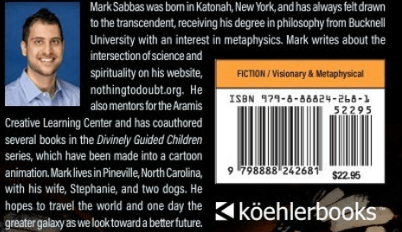After several years of writing, editing, and diving headfirst into the world of publishing, my debut novel, The Monarchs, is set to be released on June 25th of this year, currently available for preorder from major retailers (links on homepage). Published by Koehler Books, a small Virginia-based publisher which has a close-knit team I’ve much enjoyed working with, this novel is a culmination of a ten year journey ever since I received the original idea for it back in 2014, and is truly a reflection of my own spiritual awakening.
The Monarchs tells the story of seventeen-year-old Samuel Helen, one of the first in a wave of “new youth” children born into a war-ravaged world with abnormally large eyes and breathtaking psychic abilities. When the book begins, Samuel has already spent ten years at General George Mabus’s military facility, where they perform cruel testing on him and the others, although Samuel cannot control his telekinetic abilities as easily as his comrades. He finds solace in his sessions with his wise tutor, Walter, who introduces him to music records from the “old world” and teaches him philosophy. Metaphysical questions such as the existence of God, the nature of consciousness, free will versus predestination and the soul’s true purpose are addressed here and expounded on throughout the novel.
Music is also a central theme—as is the idea that we are living in a musical universe, or in Samuel’s words, the view that “all things could be expressed through vibration, sound and geometry.” From the beginning, music was a big influence on this novel, and music fans (who isn’t?) will find an added dimension in the many songs referenced throughout the manuscript, by artists ranging from The Beatles to Fleetwood Mac to Jimi Hendrix to The Flaming Lips. Although some song lyrics are overtly quoted, others are hidden in the manuscript, and when interpreted they may contain messages pertaining to the story. (Obtaining print license permissions to use these song lyrics has been a journey in itself, and is one reason the novel’s release has been delayed several months!)
Samuel’s other solace is his weekly visits with an “ordinary” orphan girl, Evelyn, who lives in the neighboring village, and whom Samuel falls in love with. Evelyn wishes to escape with him, but Samuel is hesitant, having heard tales of the “hazardous radiation” affecting most of the planet, of which many think the arrival of the new youth was a consequence. Of course, circumstances change, and Samuel and Evelyn are soon thrust out on an adventure where they meet a strange new friend; thus commencing an action-packed journey that is also filled with romance, humor, as well as uplifting spiritual wisdom.
This book is infused with symbolism and synchronicity, and the entire novel can be interpreted as an allegory for spiritual awakening, Samuel gradually becoming aware of his own essential oneness with God (or, using an analogy of a book, oneness with the author) manifesting as increased compassion for others, self-responsibility, and mastery over his extraordinary abilities.
Writing a book is a spiritual process in itself, and as previously mentioned, the original idea for The Monarchs came in 2014 during a beach trip on my college spring break. Where exactly it came from I cannot say, but I experienced it almost as if a file was downloaded into me, and it would take another decade to unpack the entirety of its contents. This was an interesting point in my life where I was graduating from college and was about to enter the corporate world, the next stage of the assembly line that was expected of any successful graduate, but this expectation merely left me depressed. Is this all there is to life? Awakening spiritually enacted a counterprogram to the materialistic incentive to rise through the corporate ladder and make lots of money. But when I received the idea for this book, I felt an inner excitement that I had never before experienced. I recall crying in my dorm room as if I were remembering a higher purpose for my life: a calling from my soul yearning to express itself.
Back then, I did try to write the book, but I had no idea what I was doing. I had pages upon pages of loosely fitted ideas, but I was at a loss of how to put it together into a coherently written novel. Ultimately, I entered the corporate world. I moved from New York to North Carolina. I met a girl, and we bought a house together. I ended up putting The Monarchs on hold for several years, yet it was always in the back of my mind, waiting for the right time to return. It wasn’t until 2019 came around that I felt that call again; I was at a more mature and settled point in my life, more confident in my ability to write a novel. I just knew—it was time. Although I started writing it again basically from scratch, the original ideas and outline for the book all came from that initial “download” I received during the spring break beach trip of 2014.
Truth be told, to this day I still have no idea what I’m doing. I never studied high-level writing; when I first received the idea for the book, I was barely much of a reader, and I never imagined that I would someday be publishing a novel. Even on the slim chance you are published, I had been told, the majority of books don’t sell many copies—you won’t make any money! I was even told by someone years ago that I should show the original pages of my draft (which were quite messy, to say the least) to a publisher, and if it isn’t any good then don’t continue because what’s the point? Thank God I didn’t listen to any of this.
Indeed, there was no special reason why I would be writing a book, except for that I was following an inner calling, a creative inspiration that seemed to stem from a force beyond normal rationality. I didn’t write it for money or status (both low forms of motivation) or even an expectation to sell many copies. I was drawn by what Dr. Joe Dispenza calls “mission motivation,” a soul-level impulse that is the highest form of motivation, and often defies the logic of the egoic mind. Doubts are inevitable, yet in order to transcend them we must enter a realm of faith in what is possible, driven by a calling that emanates from a deeper level of our being.
Herein lies an enigma of the creative process: where does the creation come from and who is responsible for it? Now that this book is coming to physical fruition, is it truly mine? For me, one of the most difficult aspects of the publishing process was filling out the “about the author” section, because who is the “I” that owns this novel? And is it even mine to own?

Most people would say that of course it’s mine! It has my name written on it. And there’s my face on the back cover! But from the moment I received the idea for the novel, I had the distinct impression that I was just a vessel for it, a means by which it could physically express itself. Many creatives feel this way; hence they have trouble taking ownership of their creations. Still others fall into the trap of attaching their sense of identity to their creative accomplishments. If I am not careful, I may make the mistake of carrying around a conceptual identity of “published author” everywhere I go—an identity even more enticing if the book ends up selling many copies.
Sure, I had a hand in giving the novel physicality, but this was simply a role I was playing. The truth is that carrying around an egoic identity in this manner would ultimately be nourishing an illusion (as is the case with every conceptual, mind-made identity we carry). The ego strives to take credit for something that it did not accomplish.
Conversely, only when the mind is quiet—when the vessel is emptied of the egoic personality—does one feel connected to the deepest wells of creativity, the source of all inspiration. It is from this place that The Monarchs was written. In a practical sense, yes, it is “my” novel, and yet I do not feel a strong sense of ownership. Rather, it is now my job to act as its caretaker, just as a bird would care for its hatchlings, feeding and guiding them until they spread their wings and soar into a life of their own.
After that happens, I have no expectations. Regardless of whether a novel sells one copy or tens of thousands of copies, whether it becomes well known or fades into obscurity, these and other external conditions should not affect one’s own sense of self-worth and identity. From my own experience, true contentedness can only come by way of a moment to moment connection with the universal creative lifeforce—what some may call God or Spirit—and this is accomplished through deep trust, surrender, and humility. Only once you are emptied of all conceptual identity, personal history, selfish desires and ambitions will you recognize its guidance. The good news is that each and every moment, you are already there. Nothing more need be accomplished.
Inevitably, I will stumble, for I am far from perfect. But through years of trial and error, I have realized the folly in allowing the ego to take the drivers seat in life, in its futile attempts to know and control everything. It will drive you off a cliff—until finally you are forced to surrender, and understand that this life you live is more than just about you. Truly, whether it be writing a novel or navigating day-to-day challenges, the egoic mind almost never knows what it is doing. Allowing a higher intelligence to guide your actions means taking a leap of faith into uncertainty and trusting your intuition; this is a lesson that Samuel himself learns. Yet once attuned to its frequency, you may notice that things just start magically working out for you, and synchronicity guides you.
So, I find myself as an author, however that may have occurred. And The Monarchs plans to be the first in a trilogy. I am excited for what the future holds, and yet I as well as other creators should allow their creations to naturally blossom without getting attached to outcomes or expectations. As Samuel ultimately realizes, life gets a little easier once we understand that we are each characters simply playing roles, and our disconnection from the author—as well as to each other—is only a temporal illusion. Still, we must do the best we can with the roles we’ve been given.



Awesome Mark! We will preorder!
<
div>
Grazia Svokos
<
div dir=”ltr”>
<
blockquote type=”cite”>
LikeLiked by 1 person
thank you!
LikeLike